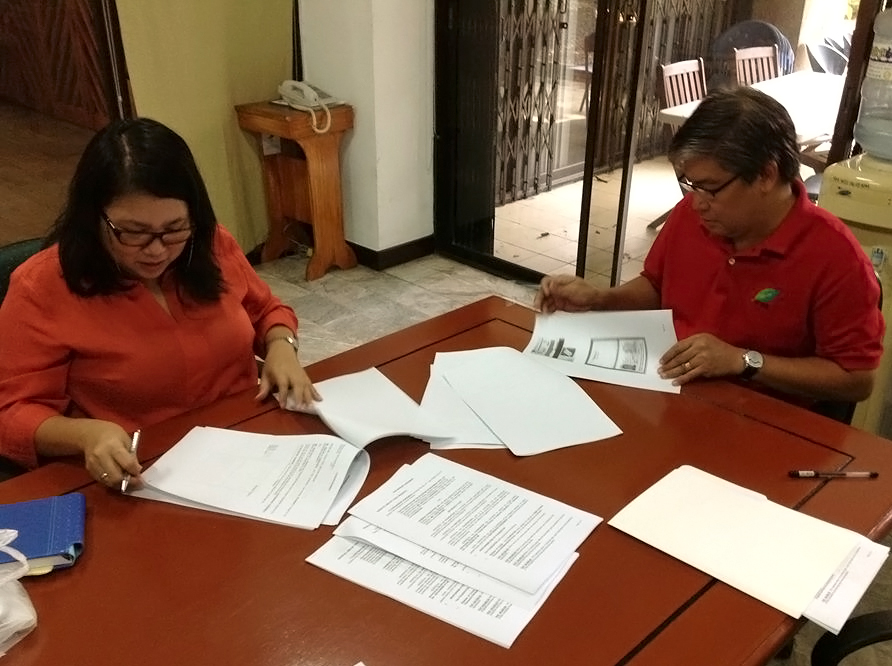News
FPE, Haribon Sign into Partnership for Forest Bill Advocacy
Posted on March 20, 2014Shown here are Ms. Beechie dela Paz, Chief Operating Officer of Haribon Foundation, and Mr. Godofredo Villapando, Jr., Executive Director of FPE, as they formally sign into the partnership agreement that will set into motion the project, "Advocating Biodiversity Conservation Policies for National Legislation."
Seeking a paradigm shift in national-level policy on forest resource management and governance, the Foundation for the Philippine Environment (FPE) and Haribon Foundation for the Conservation of Natural Resources, Inc. have partnered up for a year-long project that will push for the enactment of the Forest Resources Bill (FRB, otherwise known as House Bill No. 3638). The partnership for the project, "Advocating Biodiversity Conservation Policies for National Legislation" was made official upon the signing of the project documents last March 12, 2014.
The provisions under the FRB address not only the economic advantages of the country's forest resources, but also their respective ecological roles and services. Its enactment is envisioned to counteract existing forestry policy that favors utilization and exploitation rather than protection and sustainable use and management. With the 1975 Revised Forestry Code (PD705) being the predominant legal basis for forest management, new conservation-oriented laws such as NIPAS, IPRA, LGC, and the Wildlife Act are mostly overruled.
Acknowledging deforestation as one of the country's most pressing and persistent concerns over roughly the past century, the proponent has requested FPE's support in advocating for the enactment of the FRB within the 16th Congress, citing the relatively favorable terms between President Benigno Aquino III's administration and civil society to date. Failure to achieve this objective will subject the bill to difficulties brought about by the succeeding administration's political alignment, which will further delay conservation efforts addressing the plight of Philippine forests.
The enactment of the FRB is strongly pursued given the following important core provisions:
- The FRB uses the functional definition of "forest," that is, one that utilizes an ecosystem perspective of its physical features and biological inhabitants (including the ecological roles they each play), instead of merely the more territorially-inclined definition that prevails in current policy.
- It covers protection of all remaining natural forests, as well as restored ones. As such, "protection forestlands" will prohibit extractive activities such as commercial logging, mining, etc.
- Forest restoration is prioritized and provisions in this regard are conscious of the need to use native tree species, which have a greater chance of survival than exotic species.
- The FRB recognizes the watershed continuum as the basic forestland management unit. This holistic view has long been viewed by the conservation community as the way to go, as it places due consideration of the interconnectedness of all things, from the headwaters all the way to the reef.
- The FRB is sensitive to the subsistence needs of indigenous people and other forest-dwelling communities and therefore provides adequate access to designated woodlots, where daily timber product needs may be obtained.
- Local governments and communities are involved in forest management. Capacity-building and empowerment mechanisms are also integrated into the FRB.
The implementation of the project will entail efforts towards legislative lobbying, networkking consultations, policy formulation and advocacy, and awareness-raising.
To know more about the proponent's advocacy behind the FRB, you may read their primer here.
Read More:
- Executive Director Dr. Jerome L. Montemayor carried the banner of the Foundation for the Philippine Environment and the larger civil society during the SBSTTA 26 and SBI 4 meetings in Kenya
- Call for Proposals for the SGP-8 Country Programme Strategy
- #Y4B Ambassadors: JOEPET JEROME S. JARO
- #Y4B Ambassadors: MELLARD MANOGURA
- #Y4B Ambassadors: MARY JANE P. MAGAN
- #Y4B Ambassadors: SHRI TAHANIE B. MACAUMBAO

 DISPLAY CALENDAR
DISPLAY CALENDAR

 Read Policy Briefs
Read Policy Briefs
 View Our Partners
View Our Partners
 Access Grants MIS
Access Grants MIS
 Login to Webmail
Login to Webmail